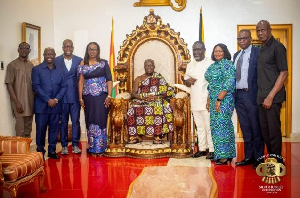- Home - News
- TWI News | TV
- Polls
- Year In Review
- News Archive
- Crime & Punishment
- Politics
- Regional
- Editorial
- Health
- Ghanaians Abroad
- Tabloid
- Africa
- Religion
- Election 2020
- Coronavirus
- News Videos | TV
- Photo Archives
- News Headlines
- Press Release
Business News of Tuesday, 17 November 2009
Source: GNA
Undersea cable revolution: Regulators gear up for challenge
Accra, Nov. 17, GNA - Telecommunications regulators in West Africa are gearing up to stem the regulatory challenges as a result of the advent of several private submarine cables landing on the shores of the sub-region. This would ensure a level playing field, affordable international bandwidth and open access broadband to benefit the greater majority of Africans.
The regulators, under the auspices of the West African Telecommunications Regulators Association, are meeting in Accra to adopt guidelines on how to effectively regulate competition, licensing, landing rights and pricing of international bandwidth and other issues related to undersea cables.
The two-day workshop, being sponsored by the German International Development Agency, is being attended by representatives of telecom regulators in West African states, including Ghana's National Communication Authority (NCA), and representatives from ECOWAS and the AU Commissions. West Africa, for many years, had access to one undersea cable, SAT-3, which connects the sub-region to the international community, beside satellite, in terms of information technology.
SAT-3, which had a relatively smaller capacity of 120 gigabytes, was monopolised by state-owned operators, including Ghana Telecom (now Vodafone Ghana), South African Telekom and others.
But recently two new private submarine cables, Glo One and Main One with 640 gigabytes of capacities each, have landed on the shores of the sub-region, specifically in Accra, Lagos and Cote d'Ivoire.
There is also the West Africa Cable System (WACS), with a capacity of 5,120 gigabytes, expected to be ready for use by the close of 2011.
Mr. Joshua Peprah, Director of Regulatory and Administration of the NCA, said with the arrival of private undersea cables, there was the need to ensure effective regulation at both the national and sub-regional levels.
He noted that regulation was necessary to ensure competitive pricing, saying currently, under SAT-3, a megabit of international bandwidth was as high as $4,500, which was about 900 per cent what it costs in other jurisdictions.
"We want to bring the cost of international bandwidth down to between $100 and $500 to make it affordable to retailers and subsequently to the masses of our people," he said.
He expressed the hope that the workshop would evolve with guidelines that would ensure increased access to broadband for greater majority of Africans.
Mr Peprah said there was, however, the need to complement the submarine cables with inland terrestrial cables to ensure that the benefits spread wider to landlocked countries.
In a speech read on his behalf, Mr. Kofi Totobi Quakyi, Board Chairman of NCA, said the landing of submarine fibre optics on the shores of Africa would create an opportunity for applications such as the Business Processes Outsourcing and enhance government's decentralisation programmes.










